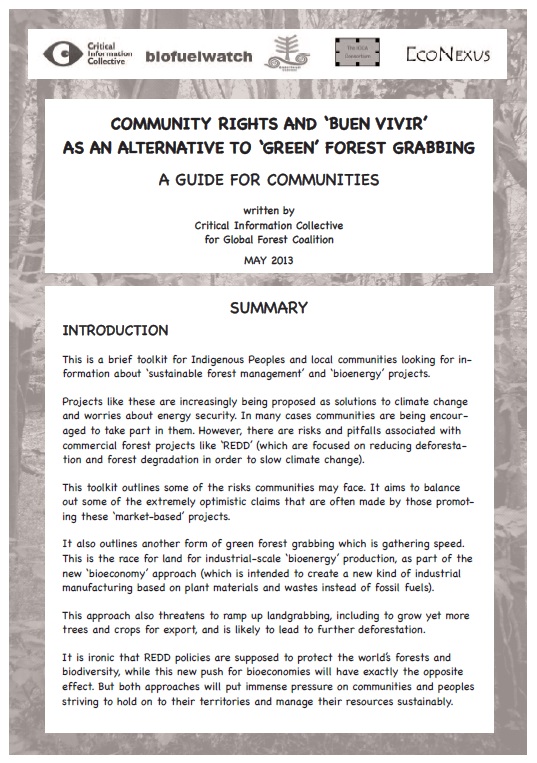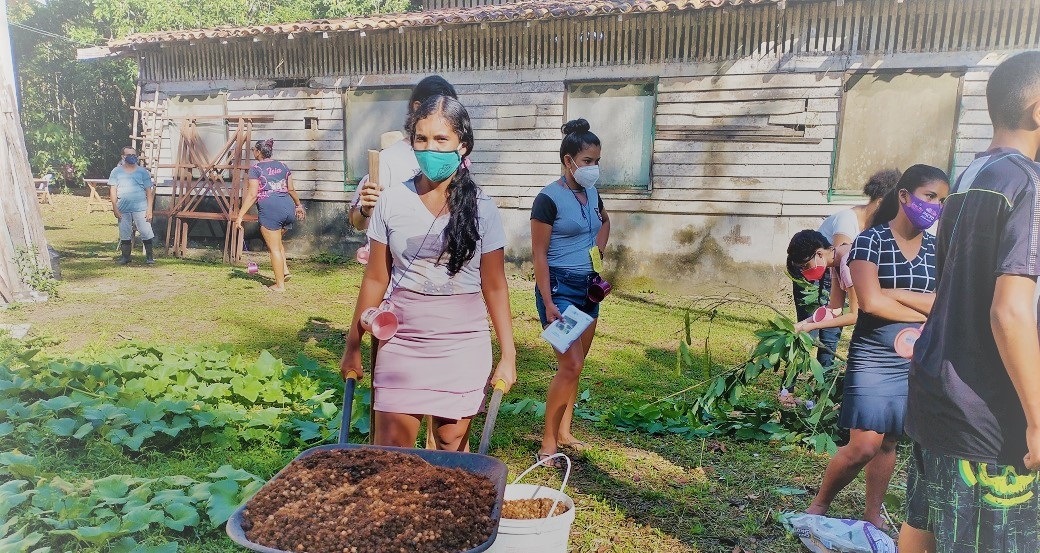Alternatives to Failed Forest Carbon Offset Schemes promoted at Climate Talks
 Bonn, Asuncion, 3 June 2013
Bonn, Asuncion, 3 June 2013
As another round of climate talks [1] opens today in Bonn, Germany, a coalition of human rights and forest groups have launched a manual for communities on alternatives to REDD+ and other forms of ‘green land grabbing’ [2].
The manual, which has been produced by the Global Forest Coalition [3], Critical Information Collective [4], Biofuelwatch [5], the ICCA Consortium [6] and Econexus [7] highlights the risks of REDD+ [8] projects and large-scale bioenergy production schemes for communities. Many of these schemes have been associated with involuntary displacements of communities and other forms of so-called ‘green land grabbing’.
“REDD+ was promoted with the fairy tale that it would generate up to 30 billion USD per year in payments to countries and communities who conserve forests, but the voluntary forest carbon offset market has provided less than 1 percent of that amount [9] and public funding is declining [10]” cautions Simone Lovera, executive director of the Global Forest Coalition, who will attend the upcoming talks. “So Indigenous Peoples and local communities risk being cheated into contracts that take away their rights to control their own lands and territories in exchange for very uncertain financial rewards.” Negotiations about REDD+ funding stalled at the climate talks in December 2012.
Demand for biomass (for biofuels and for manufacturing in proposed new ‘bioeconomies’ [11]) is already increasing rapidly, and is likely to lead to yet more landgrabbing and industrial logging in forests.
The manual proposes several alternatives to green land grabbing, including the recognition of territories and areas conserved by Indigenous Peoples’ and local communities (ICCAs) and the development of Community Protocols that help communities to identify their own conservation and development priorities.
“Indigenous Peoples and local communities have conserved their territories and areas before money was even invented” highlights M. Taghi Farvar, President of the ICCA Consortium. “They need something that can be given to them today, i.e. legal and political recognition of their own capacities and conservation efforts. They need policy support for sustainable livelihoods. They need the withdrawal of the perverse incentives that ruin their local economies… What they do not need is false promises about payments that might never come.”
Press contacts:
In Bonn: Simone Lovera, executive director, Global Forest Coalition:+31-6-15345379
NOTES FOR EDITORS:
[1] The 38th session of the subsidiary bodies of the UN Framework Convention Climate Change will take place from 3 to 14 June in Bonn, Germany.
[2] The manual Community rights and ‘Buen Vivir’ as an Alternative to Green Land Grabbing can be downloaded in English from: https://globalforestcoalition.org/wp-content/uploads/2013/06/LANDGRABBING-MANUAL-FINAL-2-EN.pdf
And in Spanish from: http://www.globalforestcoalition.net/es/wp-content/uploads/2013/06/LANDGRABBING-MANUAL-FINAL-ESP-FULL-1.pdf
[3] The Global Forest Coalition is a worldwide coalition of 54 NGOs and Indigenous Peoples’ Organizations striving for rights-based, socially just forest conservation policies. https://globalforestcoalition.org
[4] Critical Information Collective aims to provide accessible and incisive information challenging corporate-driven economic globalisation and promoting fair and sustainable alternatives: http://www.criticalcollective.org
[5] Biofuelwatch works to raise awareness of the negative impacts of industrial biofuels and bioenergy on biodiversity, human rights, food sovereignty and climate change. http://www.biofuelwatch.org.uk
[6] The ICCA Consortium is a worldwide consortium of organizations and federations of indigenous peoples and local communities, NGOs and individuals dedicated to achieving appropriate recognition and support to territories and areas conserved by indigenous peoples and local communities. http://www.iccaforum.org/
[7] EcoNexus is a not-for-profit public interest research organisation analysing developments in science and technology and their impacts on environment and society. http://www.econexus.info/
[8] Parties to the UNFCCC agreed in 2010 to develop a scheme that would provide results-based payments to projects and national policies that Reduce Emissions from Deforestation and forest Degradation and enhance forest carbon stocks (REDD+). However, there is no agreement about who or what will actually pay for this scheme yet. Nevertheless, ‘REDD readiness’ schemes are being rolled out in various countries by the World Bank and the UN.
[9] The highest amount generated by the forest carbon offset market so far was 178 million USD per year. See: http://www.forest-trends.org/documents/index.php?pubID=2963
[10] According to the REDD+ Partnership Database (http://www.reddplusdatabase.org), donor contributions were at their highest in 2011, when USD 1.14 billion was contributed to REDD+ activities. This amount dropped to USD 662 million in 2012, and for 2013 the estimates are only 229 million USD.
[11] There is a new race for land for underway for industrial-scale ‘bioenergy’ production, as part of the new ‘bioeconomy’ approach, which is intended to create a new kind of industrial manufacturing based on plant materials and wastes instead of fossil fuels. See http://www.criticalcollective.org/publications/green-economy-3/ for more information.







